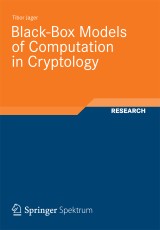Details

Black-Box Models of Computation in Cryptology
|
53,49 € |
|
| Verlag: | Vieweg & Teubner |
| Format: | |
| Veröffentl.: | 23.03.2012 |
| ISBN/EAN: | 9783834819901 |
| Sprache: | englisch |
| Anzahl Seiten: | 86 |
Dieses eBook enthält ein Wasserzeichen.
Beschreibungen
<p>Generic group algorithms solve computational problems defined over algebraic groups without exploiting properties of a particular representation of group elements. This is modeled by treating the group as a black-box. The fact that a computational problem cannot be solved by a reasonably restricted class of algorithms may be seen as support towards the conjecture that the problem is also hard in the classical Turing machine model. Moreover, a lower complexity bound for certain algorithms is a helpful insight for the search for cryptanalytic algorithms.</p><p> </p><p>Tibor Jager addresses several fundamental questions concerning algebraic black-box models of computation: Are the generic group model and its variants a reasonable abstraction? What are the limitations of these models? Can we relax these models to bring them closer to the reality?</p>
<p>Black-Box Models of Computation.- On Black-Box Ring Extraction and Integer Factorization.- On the Analysis of Cryptographic Assumptions in the Generic Ring Model.- The Generic Composite Residuosity Problem.- Semi-Generic Groups and Their Applications.</p>
<p>Dr. Tibor Jager completed his doctoral thesis at the Horst Görtz Institute for IT Security at Ruhr-Universität Bochum under the supervision of Prof. Dr. Jörg Schwenk. He is now a postdoctoral researcher at the Karlsruhe Institute of Technology.</p>
<p>Generic group algorithms solve computational problems defined over algebraic groups without exploiting properties of a particular representation of group elements. This is modeled by treating the group as a black-box. The fact that a computational problem cannot be solved by a reasonably restricted class of algorithms may be seen as support towards the conjecture that the problem is also hard in the classical Turing machine model. Moreover, a lower complexity bound for certain algorithms is a helpful insight for the search for cryptanalytic algorithms.</p><p> </p><p>Tibor Jager addresses several fundamental questions concerning algebraic black-box models of computation: Are the generic group model and its variants a reasonable abstraction? What are the limitations of these models? Can we relax these models to bring them closer to the reality?</p>
Black-Box Models of Computation
<p>Generic group algorithms solve computational problems defined over algebraic groups without exploiting properties of a particular representation of group elements. This is modeled by treating the group as a black-box. The fact that a computational problem cannot be solved by a reasonably restricted class of algorithms may be seen as support towards the conjecture that the problem is also hard in the classical Turing machine model. Moreover, a lower complexity bound for certain algorithms is a helpful insight for the search for cryptanalytic algorithms.</p><p> </p><p>Tibor Jager addresses several fundamental questions concerning algebraic black-box models of computation: Are the generic group model and its variants a reasonable abstraction? What are the limitations of these models? Can we relax these models to bring them closer to the reality?</p>

















